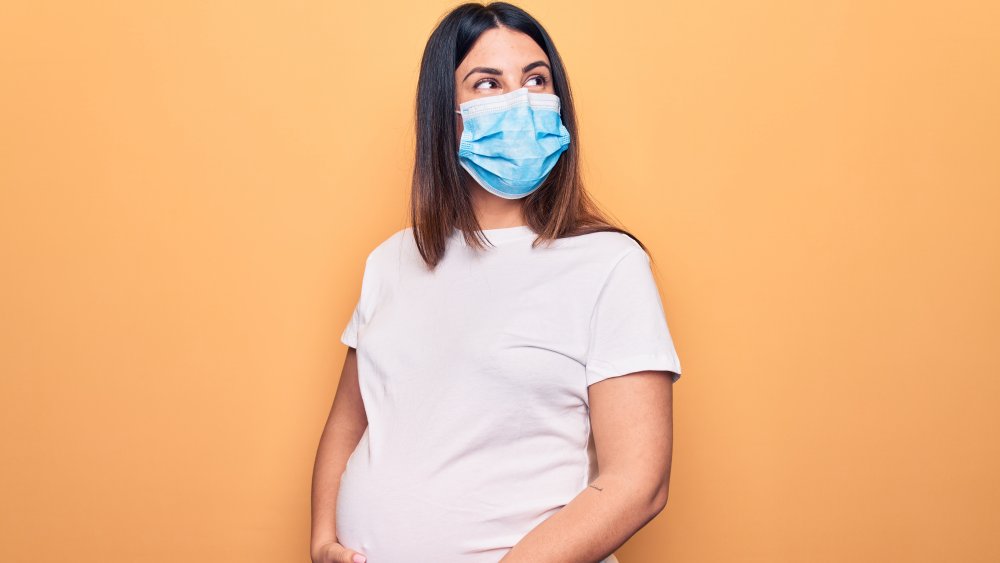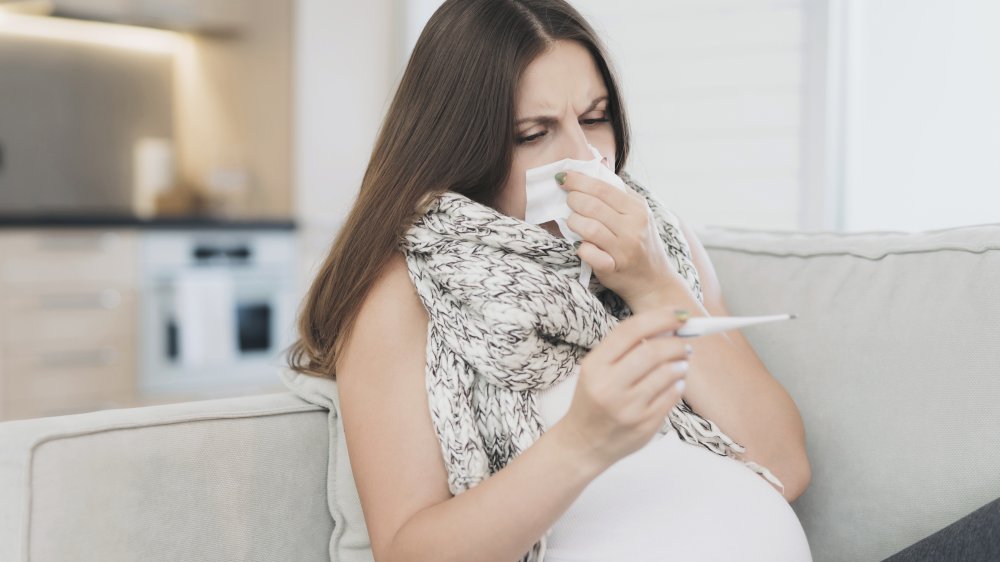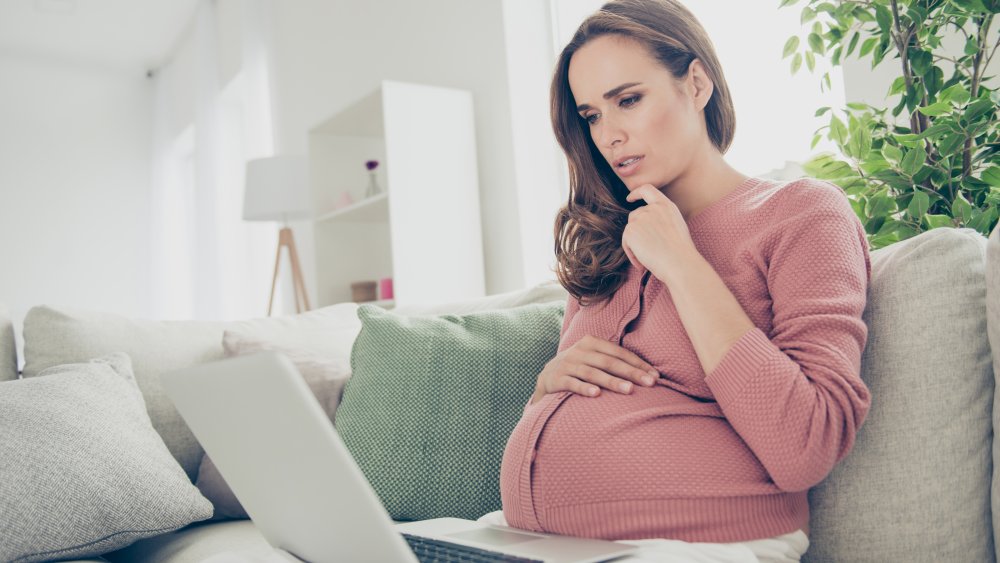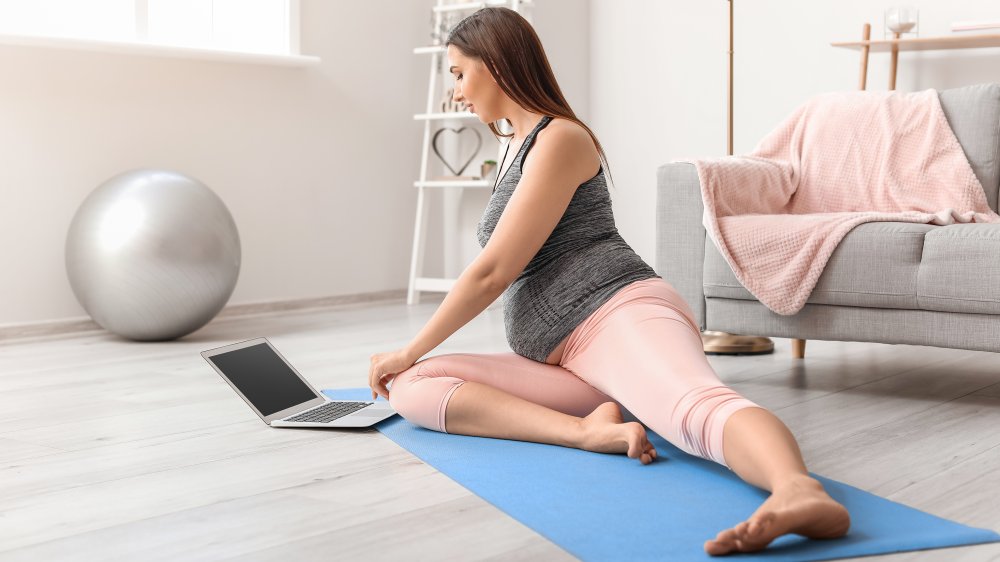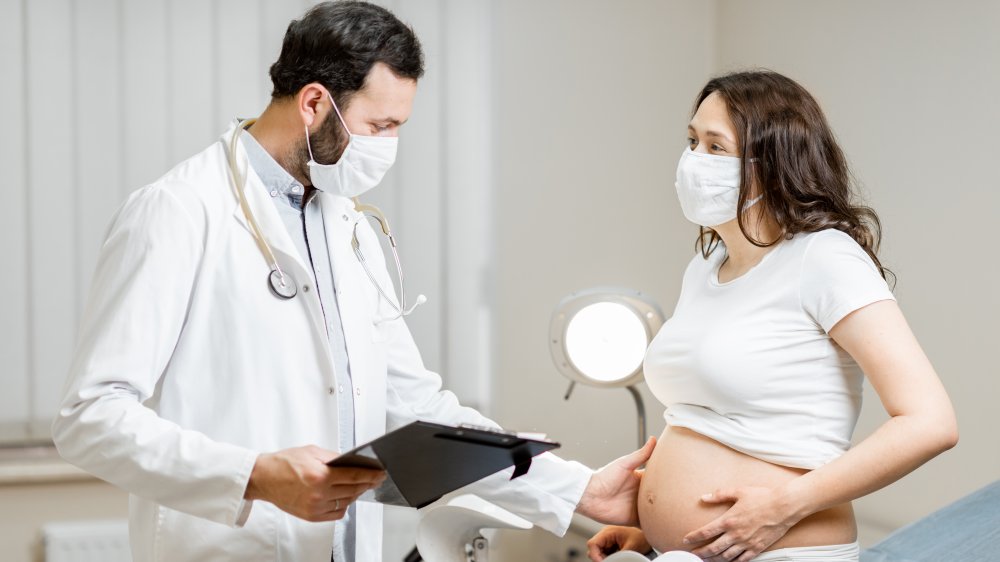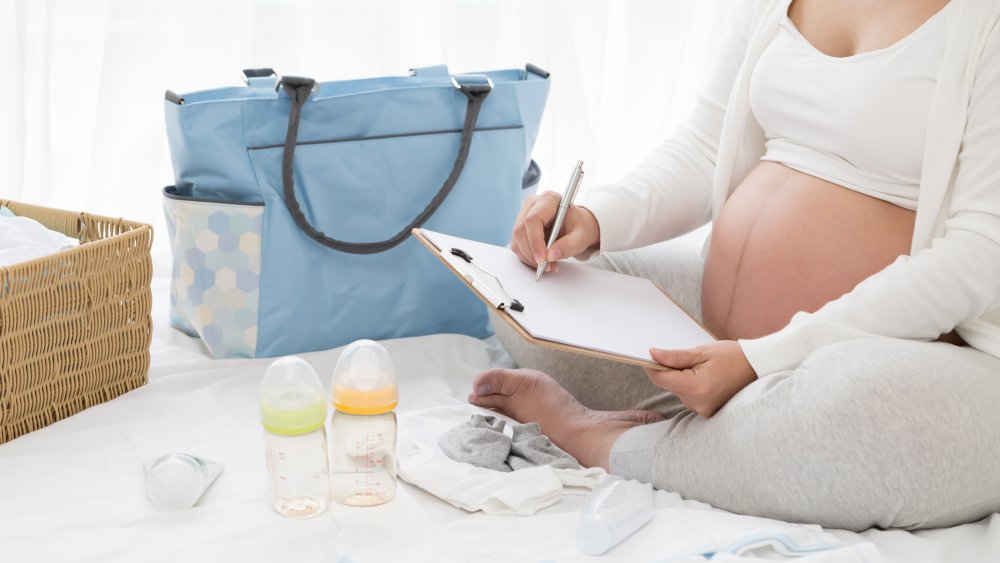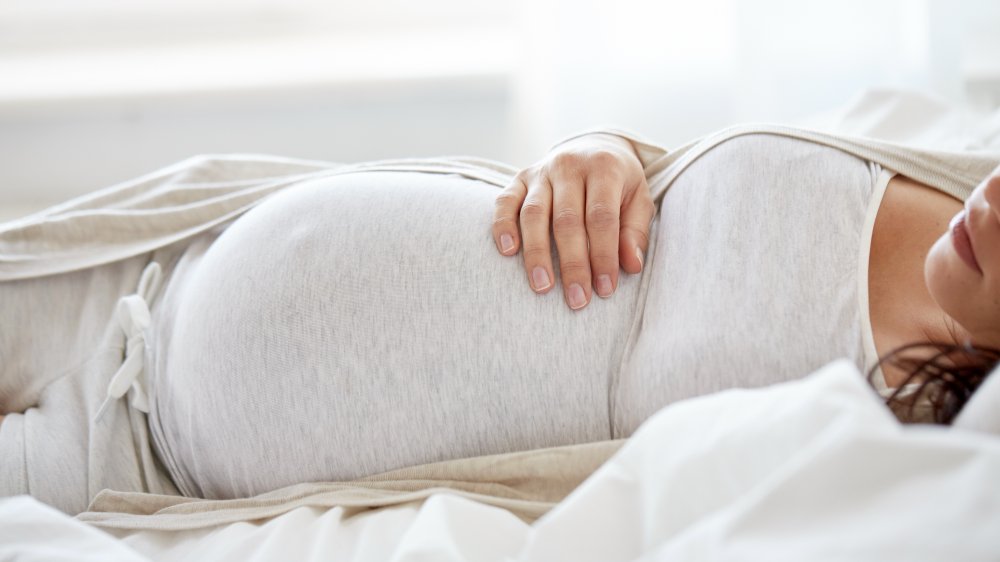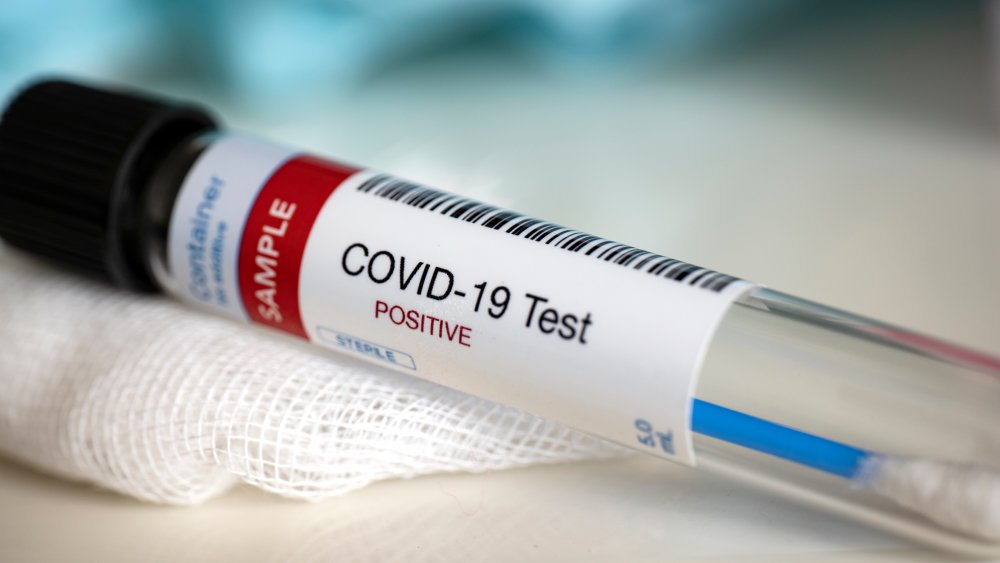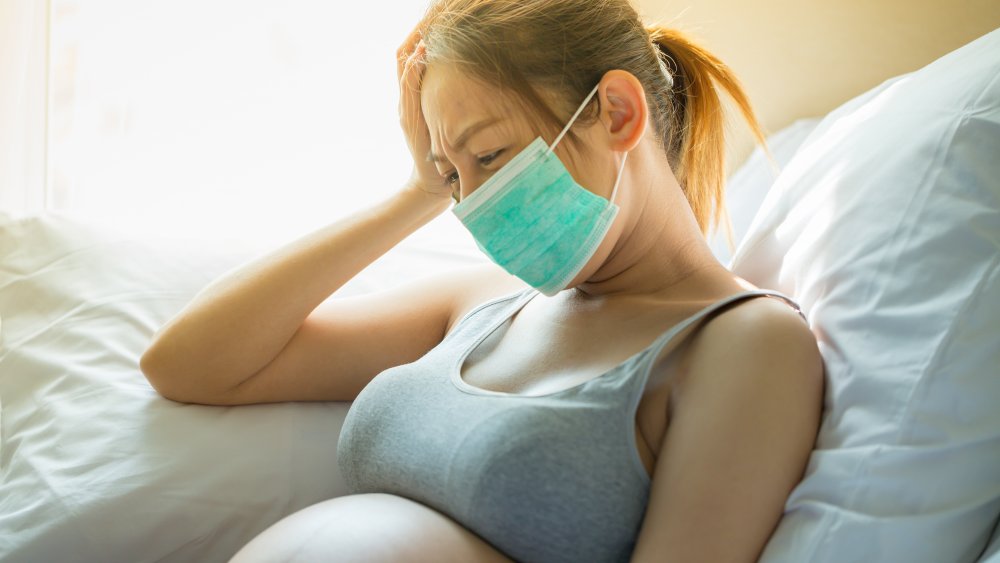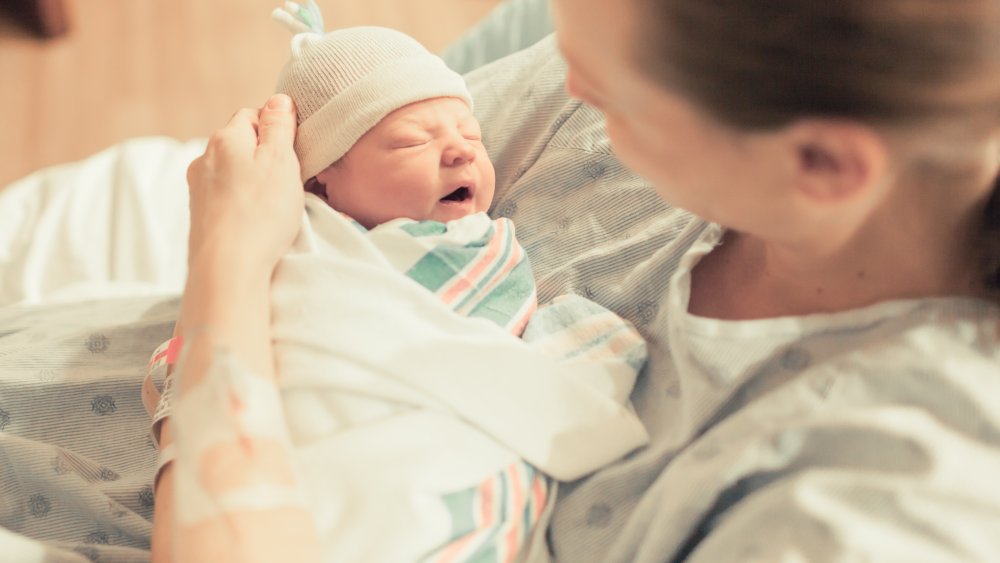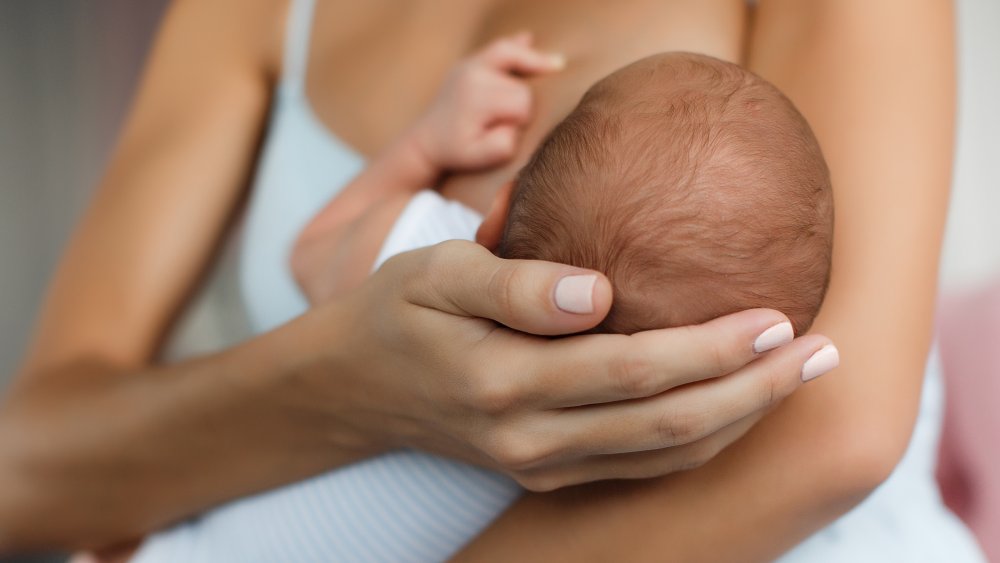The Truth About Being Pregnant During A Pandemic
Being pregnant during the coronavirus pandemic is, well, probably not what you you had in mind. While your pregnancy is supposed to be special and exciting, many soon-to-be moms may be full of concerns. With so much to be learned about the novel coronavirus and its short and long-term effects on pregnant women and their unborn babies, it is hard not to feel completely overwhelmed by both the lack of definitive information available and the nonstop news headlines.
Whether you are nine months along and sheltering in place or just a few weeks into your journey and slowly starting to resume life on the outside again, carrying a child during such an unprecedented period is no feeble feat — and it's not for the faint of heart. If you are feeling all the emotions amidst all the confusion, allow us to offer some clarity and a few answers, including some of the most important facts you need to know. Here is the truth about being pregnant during a pandemic.
You may be more vulnerable during a pandemic if you're pregnant
When pregnant, your immune system starts working double time to keep you and your unborn baby safe and healthy. While these changes enable your body to recognize the fetus growing inside you as a non-threat, they simultaneously suppress some of your natural infection-fighting abilities, according to Healthline.
In other words, you are at a greater risk of contracting viruses that your pre-pregnant self would have easily fought off. Since expecting women are immunocompromised, they are more vulnerable to the potentially serious side effects of respiratory infections like COVID-19, per What to Expect.
Additionally, as noted by Healthline, pregnant women have more fluid in their lungs, which can increase the risk of lung infections. As pneumonia is a serious complication of COVID-19, this can be of concern. Research for the novel coronavirus is, as of this writing, in its infancy so there's much more to be determined about the specific risks for soon-to-be moms. Because of this, Rajeev Fernando, an infectious disease expert, told What to Expect that it's crucial for pregnant women to stay home as much as they possibly can.
It's even more important to stay on top of your health if you're pregnant during a pandemic
It is more critical than ever for pregnant women to prioritize their health and well-being during a pandemic. In addition to staying on top of prenatal appointments, the American Pregnancy Association recommends using the myFetalLife app to track blood pressure, weight, blood glucose numbers, and baby's projected size. In case of emergency, you'll be able to easily send vital information to your obstetrician.
Furthermore, the APA emphasizes the importance of maintaining movement and exercise at home if you are sheltered in place. A healthy fitness routine is good for the body and mind, and can help improve sleep quality and boost energy levels. In short, don't put your own needs on the back burner. Laura Riley, the Obstetrician and Gynecologist-in-Chief at Weill Cornell Medicine, shared some tips on the university's site, saying "The best thing is to rely on rest, a good diet, vitamin C, and maybe even meditation."
You should take extra precautions to protect yourself if you're pregnant during a pandemic
Pregnant or not, you should be diligent about protecting yourself from infection during a pandemic. First and foremost, that means abiding by social distancing and self-quarantine regulations, as recommended by UNICEF. Additionally, the organization suggests staying away from anyone who is showing symptoms of sickness and avoiding public transportation and gatherings of any sort.
Amidst the coronavirus pandemic, Centers for Disease Control and Prevention advised pregnant women (and the general public) to wash their hands thoroughly and regularly with soap and water to avoid potential transmission of COVID-19 and to disinfect commonly touched items and surfaces. The CDC also recommended wearing a "cloth face covering" when in public spaces, although it "is not a substitute for social distancing, frequent hand washing, or other everyday preventive actions." However, the CDC warns against using any type of face covering for children under two years of age due to the risk of suffocation.
If you're pregnant during a pandemic, you can take birthing classes virtually
If you signed up for a birthing or breastfeeding class at your local hospital or community center for spring 2020, chances are it was canceled due to stay-at-home orders and social distancing rules and regulations. Still, that doesn't mean you have to be deprived of this new-mom learning opportunity.
"Pregnant women can continue their birth education with online courses and gain a good understanding of the labor and birth process," Aaron Styer, a Boston-based reproductive endocrinologist, told What to Expect. There are now a plethora of virtual courses to choose from online — from Lamaze breathing techniques to hypnobirthing to prenatal yoga and infant CPR.
You can check with your hospital or birthing center to see if they will be hosting virtual sessions or find one on your own with a simple internet search. Romper, for example, rounded up a list of over a dozen video series and virtual classes for moms and dads who want to prepare themselves for the exciting journey ahead, but have to do it in a socially-distant way.
You might not see your doctor as often if you're pregnant during a pandemic
Doctor's offices made some major shifts during the coronavirus pandemic. According to The New York Times, "some low-risk expectant parents" are now being asked to go "10 weeks between in-person appointments" to lower their exposure. Indeed, the American College of Obstetricians and Gynecologists adjusted their recommendations for prenatal care in response to the pandemic, encouraging doctors to consolidate important tests and vaccines to reduce frequency of appointments and consider telemedicine options whenever possible.
Some important screenings can't be done virtually, but you can still mitigate risk. Consider asking if you can wait in your car until the doctor is ready to see you, as suggested by What to Expect. Additionally, the site's experts recommend wearing a face mask, washing your hands, and consciously avoiding touching your face during in-person appointments.
If you're still nervous, the Centers for Disease Control and Prevention has one very simple solution: Voice your concerns to your healthcare providers, hear out the precautions they're taking, and make a plan together.
You could experience increased stress and anxiety if you're pregnant during a pandemic
Approximately 10 to 20 percent of pregnant women will experience a mood disorder during pregnancy, according to Healthline. It's true that even under the most normal circumstances, fluctuating hormones and pregnancy stress can cause anxiety and depression. Add a pandemic to that equation, and it's no surprise that these women would go on to feel a heightened sense of hopelessness.
In an interview with Marie Claire in April 2020, Pooja Lakshmin, a psychiatrist and clinical assistant professor of psychiatry at George Washington University, noted "seeing a worsening of symptoms in women who were already struggling with perinatal anxiety and depression" and that "women who were previously struggling with anxiety now manifest symptoms of depression." She elaborated that the lack of normalcy, limits on socialization, and absence of physical outlets can further fuel a patient's despair.
The American College of Obstetricians and Gynecologists recommends that pregnant women experiencing stress connect with friends and loved ones — even if they can't physically be together. Furthermore, the ACOG suggests practicing mindfulness to combat acute anxiety: "Breathe in for 4 seconds, hold for 7 seconds, and breathe out for 8 seconds. Repeat three times."
If you're pregnant during a pandemic, you can have a drive-by or virtual baby shower
Pregnant women are getting deprived the experience of a traditional baby shower, complete with gifts, games, and excessive belly ogling. But even if you are unable to celebrate in person with friends and family, you can still feel sprinkled with love and affection — albeit from a safe distance. "Drive-by parties are definitely an inventive concept to spring out of the need for social distancing. They could be described as a 'party parade,'" Lindsey Mensch, owner of Lili Marie Parties in Chicago, told What to Expect.
A drive-by fête can be as elaborate or low-key as you make it. You can set up a designated space for gift drop-off, decorate the exterior of the house, and get dressed up for your big day. You can even "sit on your lawn sipping a specialty mocktail while guests drive by," as suggested by Mensch.
If a brigade-style shower isn't your thing, you can host a virtual affair instead. Babylist offered lots of suggestions to put together your Zoom or Skype event, including mastering the tech side of the event, choosing a theme, and embracing those severely corny games.
You may have to make some concessions if you're pregnant during a pandemic
While every hospital may have its own set of operating rules, the policies at many institutions changed and continually evolved during the coronavirus pandemic. As such, you'll want to talk to your healthcare provider to get a better snapshot of your hospital's rules as having expectations in place can help you create a suitable birthing plan. Empower yourself to set out the vision you have for your labor and delivery experience — but also understand you'll have to be flexible given the circumstances should you deliver during a pandemic.
"It's important to realize that a safe and healthy baby is paramount. If there are changes or the birth plan is not consistent with protocol, it's crucial to be respectful, not only of healthcare workers, but also of other mothers and their babies," Dallas-based obstetrician-gynecologist Jessica Shepherd told What to Expect.
So what policy changes should you anticipate during a pandemic? For one, you may not want to bank on being able to venture out to walk the hallways while laboring as you may have to stay within your room, noted the site.
If you're pregnant during a pandemic, should you consider a home birth?
Many pregnant women began considering switching from a hospital birth to a home birth in response to the coronavirus pandemic, and some midwives are experiencing an uptick in inquiries, as noted by The New York Times. While birthing at home with a midwife and doula can be rewarding, it's certainly not the right choice for everyone. For starters, there are no pain medications or epidurals offered.
Additionally, as noted by Vox, women who are at risk for complications, expecting multiples, or have had previous C-section surgeries are better off opting for a hospital atmosphere. Furthermore, the American College of Obstetricians and Gynecologists recommends against home births — even during the coronavirus pandemic — noting that while they are positively correlated with less medical interventions, like C-sections, they are linked to an increased rate of infant mortality.
Additionally, in the event of a medical emergency during a home birth, getting to the hospital could create an obstacle. Dr. Christina Han, associate professor at the University of California, told The New York Times that ambulance services could take longer than usual to arrive during a pandemic.
If you're pregnant during a pandemic, you may be screened for infection at the hospital
When you arrive at the hospital in labor, your team will immediately get to work, checking your vitals and getting you settled in. If you're arriving during the coronavirus pandemic, one new addition to the routine could be a COVID-19 rapid test or nasal swab. While this is not a universal standard across the United States, many hospitals have implemented a plan to screen pregnant women right away.
As noted by early research, determining whether a mom is positive or negative for COVID-19 from the get-go can help inform important medical decisions, tailor postpartum and neonatal care plans, and determine the types of personal protective equipment doctors and nurses need.
Furthermore, immediate testing can identify asymptomatic patients who, though not visibly ill, are contagious. A study in The New England Journal of Medicine involving over 200 pregnant women in New York City who were admitted for labor and delivery indicated that, while 29 of them were positive for COVID-19, only four exhibited symptoms upon arrival.
If you're pregnant during a pandemic, you may have to labor while wearing a mask
Huffing, puffing, and laboring through a face covering may not sound ideal, but it started to become par for the pregnancy course during the coronavirus pandemic. Shannon Mork, who gave birth in April 2020, recounted her experience in an interview with NBC Montana. "Being in labor to begin with is difficult, but then when you have to wear a mask and you're breathing heavy like that, it's tough." Still, she expressed gratitude to the medical staff who helped her through the harrowing delivery. "I have a huge respect for those nurses, because I had that mask on for maybe 30 minutes, and by the time I had my daughter, it had a bunch of condensation and everything in it, and those nurses wear those masks all day long for their entire shift," she said.
Samantha Benson, an obstetrics nurse, wrote an article for Today to reassure moms about laboring during the pandemic, explaining, "Very often when women are in labor, we use an oxygen mask, so at some point during the process they'll probably end up with that mask on anyway."
You could be discharged from the hospital early after giving birth
In non-pandemic times, the standard hospital stay is two days after a vaginal delivery and four for a C-section, according to Parents. But during the COVID-19 outbreak, many hospitals began discharging healthy moms and newborns earlier to mitigate their risk of exposure — and many patients were eager to hasten the process as well.
Dr. Leana Wen, a Baltimore-based emergency physician, chronicled her experience having a baby during a pandemic for Today. After delivering a healthy baby girl, she shared her feelings about getting out of dodge: "We are now obsessed with the idea of trying to leave as soon as possible...The providers are wonderful here, we love the hospital, but we are worried about exposure."
As recommended by the American College of Obstetricians and Gynecologists, it is acceptable to "expedite discharge when both the mother and the infant are healthy." Per this updated guideline, the ACOG suggests discharge after one day for women with "uncomplicated" vaginal births and two days after a C-section, "depending on their status." Telemedicine appointments can further help address immediate postpartum needs when you can't see a medical professional up close and personal.
Your breastfeeding plans don't necessarily have to change in a pandemic
If you find out you have the novel coronavirus mid-pregnancy or after you arrive at the hospital for delivery, it can be a scary turn of events. It's reassuring to note, though, that the Centers for Disease Control and Prevention has determined that "mother-to-child transmission" of COVID-19 is "unlikely" during pregnancy.
Instead, the greater risk occurs when a newborn is being cared for by a coronavirus-positive parent. Still, even if you have the virus when your baby is born, you can most likely maintain a plan to breastfeed. As noted by the CDC, a mom's breast milk gives baby immunity from many infections, and is considered the "best source of nutrition." Early research, cited by the health agency, indicates that breast milk is not a vehicle of transmission. Still, a nursing mom should take some precautions and wear a mask when feeding her child skin-to-skin. Another option is to pump breast milk and have a healthy caregiver bottle-feed the baby.
If you're pregnant during a pandemic, you might only be allowed one support person at the hospital
With the threat of COVID-19, many hospitals changed their guest policy and delivering moms were allowed to be accompanied by just one support person, as noted by Medical News Today. In New York in March 2020, for example, a designated support person was permitted but had to be screened for symptoms and receive a temperature check every 12 hours, per the state's Department of Health.
Deciding who should be by her side during delivery can be difficult for a woman; while partners and co-parents are often the obvious choice, many women would like to have a trained doula in the delivery room. As a temporary solution, many doulas began virtually attending births and offering expertise from afar, as chronicled by Vogue.
The birth of a baby is a joyous occasion and before the coronavirus pandemic became a reality, many new parents happily welcomed friends and family into their respective recovery suites. For everyone's safety, having visitors during a pandemic is a no-go and grandparents and relatives should wait to meet the newest member of their family.
